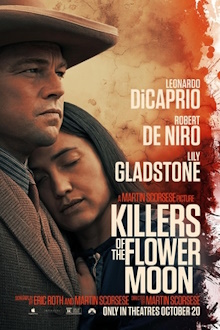A while back, I mentioned how Martin Scorsese always seems to make the same type of mobster film. Well, he certainly proves me wrong on that count with this epic about a conspiracy to kill practically an entire American Indian tribe. Three and a half hours is long even by Scorsese standards, yet he makes good use of every second of it and just barely manages to tell the whole story. Telling it through the perspectives of Ernest and Mollie made all the difference as it creates this creeping sense of dread as Ernest is one of the conspirators killing her people all along. It’s the perfect material to be adapted to film really as you really want more people to remember this heinous crime.
After World War I, Ernest Bukhart arrives in Oklahama to join his brother Byron and his uncle William King Hale. Hale speaks fluent Osage and presents himself as a friend and benefactor of the Osage people. In reality, he is at the heart of a conspiracy to murder them to obtain the rights to the oil on their lands. As Earnest works as a driver by day and occasionally robs the Osage at night with Byron, Hale encourages him to get close to Mollie Kyle, an Osage woman whose family owns such headrights. Eventually he marries Mollie and they have three children together. As the years pass, more and more Osage die under suspicious circumstances and there is never any proper police investigation. The most egregious case involves Anna, one of Mollie’s sisters who is married to Byron. She gets very drunk one night and turns up dead the next day. The Osage elders gather money to send a representative to Washington DC to plead for action by Congress and even hire a private investigator. But these efforts are stymied by Hale’s goons, including Ernest himself, at every turn until the fledgling FBI gets involved.
Both Ernest and Hale are the villains of the piece and it’s honestly impossible any redeeming quality in them at all. DiCaprio is particularly courageous for playing a character who is not only villainous but also a moral coward. He lets Hale walk all over him again and again and readily takes up the position of whoever spoke to him last. What makes this film fascinating is that he does genuinely love his children and thinks that he loves Mollie. Yet he lacks the moral fiber to reconcile this love with the fact that he is actually killing Mollie and her family members and to stand up to Hale. A telling moment is when he tells Hale that Mollie is pregnant again even as he is involved in slowly poisoning her, leading Hale to think that he a pervert of some kind. It’s difficult for me to understand why the Osage didn’t do more to protect themselves and why Mollie is so passive and trusting of Ernest up to the very end. But of course this needs to be seen in context of the very hostile and corrupt government apparatus at the time as they were continually frustrated in their attempts obtain justice through legal means. The film doesn’t dwell on it, but the Osage’s rapid ascent to wealth and their lack of experience in dealing with money and the laws of white men surely mattered as well.
As you’d expect of Scorsese, this is a fantastically produced film on every level. DiCaprio goes out of his way not to look like his usual character though it’s arguable how much he succeeds. De Niro is so interesting in that in some scenes, he looks so small, a shriveled husk of a man in a large chair. In other scenes, he looms so large, the powerful mob boss able to intimidate everyone. I like how the subject matter is so different from the usual Italian and Irish gangsters, yet simultaneously something is very much in Scorsese’s wheelhouse. My main regret is that like his other films, this one is more interested in the buildup than the fallout once the conspiracy falls apart. There’s an amusing radio play at the end to narrate what happened afterwards but I keep wanting the catharsis from Mollie or one of the other Osage members directly confronting Hale and Ernest and it never comes.
I held off of watching this for a long time because it’s so long and because as great a filmmaker as Scorsese is, he’s never been one of my favorite directors. I’m forced to admit here that he has a gift for identifying and adapting important stories from the history of the United States. The story about the Osage may have been told and retold in many forms but it’s still one that deserves to be more widely known as the scale of the injustice involved is just breathtaking.
